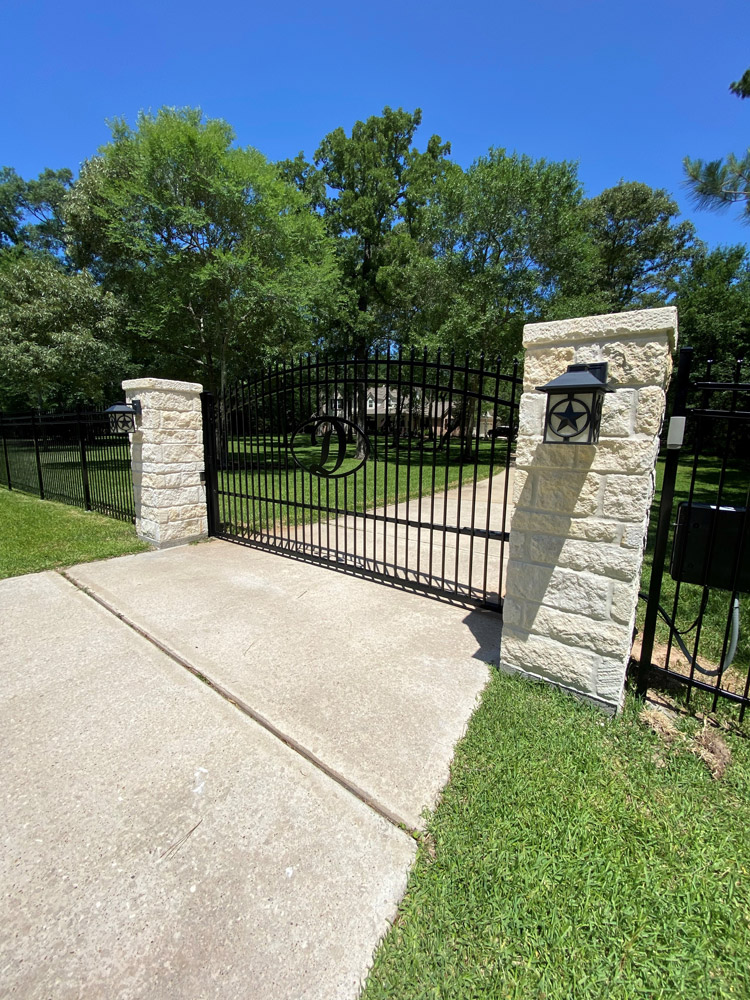Driveway Gate Installation Choices: Texas Fence
There are several types of driveway gates to consider, including swing gates, sliding gates, and bi-fold gates. Each type offers unique advantages in terms of space efficiency, security, and aesthetic appeal. When considering a driveway gate installation, it’s important to choose the right type based on your specific needs and property layout.

Driveway Gate Types
Driveway gates come in various styles, offering different opening mechanisms to fit various property layouts. Understanding the differences between these types can help determine the most suitable option for securing your home.
Swing Gates
Swing gates operate similarly to doors—they open inward or outward on hinges. They are best suited for homes with ample driveway space, requiring a buffer zone for uninterrupted movement. If you have adequate space and prefer a traditional entrance look, swing gates might be the right choice for you. These gates work well in both residential and commercial settings and come in a wide range of materials and designs.
One key consideration when opting for swing gates is ensuring there’s enough space not only for the gate to open but also for vehicles to park without obstructing its movement. Additionally, the terrain around your property may impact the operation of swing gates. For example, if your driveway has an upward slope or uneven ground, this may affect the ease with which swing gates can open and close. It’s vital to assess your property’s surroundings thoroughly before deciding on swing gates.
Sliding Gates
In contrast to swing gates, sliding gates are suitable for properties with limited driveway space. Instead of swinging open, these gates operate by sliding horizontally along the fence or wall. This makes them an excellent choice for driveways with limited space where traditional swinging gates might be impractical. These gates are popular for their smooth, quiet operation and high level of security.
Sliding gates are also commonly seen in commercial properties due to their efficiency and practicality. The sleek characteristics of sliding gates make them an attractive solution for areas with tight confines.
Bi-Folding Gates
Bi-folding gates consist of two panels that fold together at the center when opening and form a single flat surface when closed. These are an excellent choice when dealing with limitations on how far back into your property a gate can extend. They offer an effective space-saving solution while also providing a secure barrier.
Many homeowners find bi-folding gates aesthetically pleasing due to their modern look and smooth operation. Their compact nature makes them particularly useful when there are spatial constraints preventing the use of other gate types.
Understanding the nuances of each driveway gate type is crucial in making an informed decision that aligns with both functional needs and aesthetic preferences. Each style brings unique benefits and considerations that cater to varying property requirements, so thoughtful consideration is paramount before committing to a specific type of driveway gate installation.
As we’ve delved into the diverse types of driveway gates and their suitability for different property layouts, it’s time now to explore the advantages of having automatic driveway gates installed.
Advantages of Automatic Driveway Gates
One of the most prominent benefits of having an automatic driveway gate is the convenience it provides. Imagine having the ability to open and close the gate without ever leaving your car. It’s like having a doorman who responds to your every command. This feature is particularly handy during inclement weather, providing a dry and hassle-free entry or exit. Plus, it saves you time, which is our most valuable and finite resource.
Automatic driveway gates also offer enhanced security with their automated operation and secure locking mechanisms. They act as a powerful deterrent against unauthorized entry. Unlike traditional gates, which are easy to bypass, automatic gates are equipped with sensors that prevent them from closing if there’s an obstruction, ensuring the safety of both people and vehicles.
Furthermore, the property value receives a considerable boost with the installation of an automatic driveway gate. Besides its practical features, an automatic gate adds an element of sophistication and exclusivity to the property, potentially increasing its curb appeal and overall value. Many homebuyers look for additional security features when purchasing a new home, so an automatic driveway gate can be a compelling selling point.
Upkeep is an essential consideration for maintaining the advantages provided by automatic driveway gates. Ensuring regular maintenance keeps the components in excellent working order, prolonging the lifespan of these gates while preventing breakdowns and costly repairs down the line.
By blending convenience, security, and increased property value, automatic driveway gates offer a compelling option for homeowners looking to enhance their property’s functionality and aesthetic appeal.
Understanding Manual Driveway Gates
When discussing manual driveway gates, we’re referring to traditional, hand-operated gates that open through swinging or sliding mechanisms, setting them apart from their automatic counterparts. Although not as convenient as automatic ones, manual gates offer unique advantages and can function as a reliable security solution for many homeowners.
Manual driveway gates are often favored for their simplicity and affordability. Because they don’t require electronic components or a power source, they tend to be more cost-effective than automatic gates. The absence of complex electrical systems means less maintenance and fewer opportunities for technical malfunctions—making manual gates a reliable long-term investment that requires minimal upkeep.
Another notable aspect of manual driveway gates is their robustness and durability. With fewer moving parts and no electrical components to contend with, these gates are known for their longevity when properly maintained. They can withstand various weather conditions and still function effectively without being susceptible to power outages or electrical failures.
However, manual driveway gates may require some physical exertion to operate compared to their automated counterparts. Homeowners should consider this factor, especially if they have mobility issues or if frequently opening and closing a gate manually would be inconvenient. Nonetheless, for those who prioritize a more budget-friendly yet reliable security option, manual driveway gates remain an appealing choice.
Finally, manual driveway gates provide an added layer of control and privacy. Homeowners can choose when to open or close the gate, regulating access to their property at all times. This level of control can create a heightened sense of security and privacy, which is particularly important in certain neighborhoods or areas where traffic needs to be monitored closely.
In conclusion, while manual driveway gates may lack the automated convenience of their counterparts, they present a durable, cost-effective, and reliable security option. Their simple yet effective design ensures lasting security with minimal maintenance demands, making them an appealing choice for homeowners seeking dependable protection for their properties.
As we’ve examined the benefits of manual driveway gates for home security, it’s essential to consider the material aspects when deciding between wood and metal gate materials. By diving into this choice, we’ll uncover key considerations in choosing the right gate material for your specific preferences and requirements.
Deciding Between Wood and Metal Gate Materials
Wood and metal are two popular materials for driveway gates, each with its own set of advantages and aesthetics. Let’s delve into the details to help you make an informed decision.
Wood Gates
Wood gates have a classic, rustic charm that can enhance the visual appeal of any property. They offer a traditional and natural aesthetic that complements various architectural styles. Additionally, wood gates are incredibly versatile, providing homeowners with a wide range of design options such as a simple, elegant design or a more intricate pattern. The finish of wood gates can be customized to match the overall theme or color scheme of your property, adding a touch of personalization. However, wood gates require regular maintenance—staining or painting—especially in climates with high humidity or significant temperature fluctuations.
Metal Gates
On the other hand, metal gates, such as wrought iron or aluminum, are renowned for their durability and low maintenance requirements. They provide a sleek and modern look to your property’s exterior. Depending on your preference, metal gates can be customized with decorative elements that add sophistication or a touch of luxury to your entrance. While they typically require less maintenance than wood gates, periodic cleaning and inspection for rust or corrosion is recommended.
Both wood and metal gate materials have their unique appeal and practical considerations that should guide your decision-making process. The choice between wood and metal ultimately depends on your aesthetic preferences, desired level of maintenance, and the environmental factors specific to your location.
So when deciding between these two materials for your driveway gate installation project, consider factors such as the visual impact you want to achieve, ongoing maintenance requirements, and the long-term durability of each material. In summary, choosing between wood and metal gate materials invites a thoughtful examination of practicalities such as weather resistance, customization options, and long-term maintenance needs. Each material has its own character and charm that can either complement or enhance your property’s overall aesthetic appeal.
Discover the Perfect Style and Design
When it comes to the style and design of your driveway gate, it’s not just about your personal preference—it’s also about ensuring it harmonizes with the overall look of your home and landscape. Different styles work better with different types of homes, and it’s all about finding a design that enhances your property. Let’s explore how you can discover the perfect style and design for your driveway gate.
Consider Your Home’s Architectural Style
The first thing to think about is what type of house you have. Is it modern or traditional? Perhaps it has a classic ranch-style or a Victorian look. Each of these architectural styles lends itself to certain gate designs. For example:
| Architectural Style | Ideal Gate Design |
| Traditional Colonial or Victorian homes | Ornate wrought iron gates |
| Rustic countryside settings or properties with a farmhouse-style aesthetic | Rustic wooden gates |
How the gate style aligns with your home’s architecture is crucial. It needs to look natural and organic, blending seamlessly into the backdrop of your property.
Assess the Surrounding Landscape
Another key factor is to consider your landscaping. If you have beautifully manicured gardens, you’d want a gate design that doesn’t overshadow them. On the other hand, if you have giant oak trees or old stone pathways leading up to your home, a more rustic or antique-style gate might be a better fit.
The goal here is harmony—a completion of the overall picture and feel of your property.
Balance Security with Aesthetics
While aesthetics are important, it’s equally crucial not to compromise on security for the sake of looks. You should find a balance that combines security features without sacrificing visual appeal. For instance, you can choose strong, durable materials like iron or steel that can be crafted into elegant designs without compromising security.
It’s about achieving a combination of attractiveness and functionality in selecting your driveway gate style.
With these considerations in mind, choosing the right style and design for your driveway gate will enhance your property’s aesthetic appeal while providing reliable security—a perfect marriage of beauty and strength.
Improve Security and Privacy with Your Driveway Gate
The decision to install a driveway gate is not just about adding a stylish feature to your property; it’s also a key move in enhancing your home’s security. A well-crafted and properly installed driveway gate helps you control access to your property, which means you can decide who comes in and out. This control over vehicular access is essential for maintaining a secure environment for your family and belongings.
When you match your driveway gate with advanced access control features like intercoms or keypads, it adds an extra layer of security. These additional features act as the gatekeeper, allowing only authorized individuals to enter your property. It’s like having a personal bouncer for your home, making sure that only people on the guest list are allowed past the velvet rope.
Imagine coming home after a long day at work, tired and wanting nothing more than to relax. As you pull up to the gate, you have peace of mind knowing that unauthorized vehicles cannot enter your property, safeguarding your privacy and ensuring that uninvited visitors stay out.
In case of unwanted solicitors or intruders, your driveway gate acts as a strong deterrent, discouraging them from attempting to gain access to your property without permission.
With rising concerns about privacy and security in residential neighborhoods, installing a driveway gate becomes more than just a convenience—it’s an essential part of securing your property against unwanted access from strangers or unauthorized vehicles. Additionally, it can provide children and pets with a safe area to play outdoors without you having to worry about them wandering onto the street or strangers entering the property.
It’s clear that integrating a driveway gate into your property can significantly improve both security and privacy. The combination of physical barriers with modern access control features provides peace of mind and control over vehicular access to ensure the safety of your family and maintain privacy within your property boundaries.
The comprehensive guide toward heightened residential security doesn’t conclude here. Now let’s delve into the estimation of costs to get the full picture of turning your residence into an impregnable fortress.
Estimating the Cost of Installation
When it comes to driveway gate installation, the cost can vary widely depending on multiple factors. The first step in estimating the cost is selecting the material of the gate. Different materials have different price points – wood and wrought iron tend to be more expensive than aluminum or chain-link.
For example, aluminum gates are generally more affordable compared to iron gates but they don’t compromise on durability and are less prone to rust over time. It’s important to factor in not just the material costs but also look at its ability to withstand different weather conditions.
Another important aspect to consider is the size of the gate. Larger gates will naturally cost more because they require more materials and often, additional structural support for proper installation. A smaller gate will come with leaner requirements.
It’s interesting how intricate details in design can affect cost as well. Gates with ornate designs or custom engravings will naturally demand a higher price. Moreover, if you opt for automation, which provides added convenience and security, the overall cost goes up significantly. The complexities of an automated system such as gate openers, sensors, remote controls add a layer of expenses.
Installation costs can also rise if you decide on additional features like intercoms or surveillance cameras integrated into the gate system.
Our team always takes every requirement and configuration into careful consideration when estimating costs for customers. We guide them through available options while factoring in their budget to ensure they get the best possible solution.
Every installation is unique and our estimates are tailored accordingly because no two installations are alike due to different architectural layouts and customer preferences.
In summary, it’s vital to weigh all these considerations before making a decision on your driveway gate installation project.
Considering Cost
Remember learning about a balanced diet in school? Well, think of this as a balanced cost assessment where you need to see what type of material, size, design complexity, desired features, and level of automation makes sense for both your budget and security needs.
Understanding each expense that adds up along with how various factors affect the overall cost allows you to make an informed decision when choosing a driveway gate that matches both your preferences and budget constraints.
Maintenance and Troubleshooting Tips
A driveway gate not only adds elegance but also provides an extra layer of security to your home. To keep it functioning smoothly, regular maintenance is key. Here are some essential tips to ensure that your gate stays in top shape:
Regular Lubrication
A well-lubricated gate operates quietly and efficiently, reducing wear and tear on moving parts. Use a silicone-based lubricant on the hinges, rollers, and tracks every three to six months.
Checking for Wear and Tear
It’s vital to inspect your gate regularly for any signs of wear or damage. This includes rusty components, chips or cracks on the gate, and loose screws or bolts. Identifying these issues early can prevent bigger problems down the road, saving you money in repair costs.
Ensuring Structural Integrity
Periodically assess the structural integrity of the gate. Look for any sagging, misalignment, or other issues that could affect its operation. A sturdy gate keeps your property secure and adds to its curb appeal.
Troubleshooting Tips
Now, let’s discuss some troubleshooting tips for addressing common driveway gate issues:
- Gate Misalignment: If you notice that your gate doesn’t close properly or appears crooked, it might be misaligned due to changes in ground elevation or worn-out hardware.
- Sensor Malfunctions: Gate safety sensors are crucial for preventing accidents. Regularly test and clean these sensors to ensure they work correctly.
- Electrical Problems: Electrical components can face issues over time, including problems with the control panel, remote access systems, or wiring. These need regular inspection to identify potential electrical concerns early.
By following these maintenance and troubleshooting tips, homeowners can ensure the optimal functionality and longevity of their driveway gates while keeping their properties safe and secure.
Maintaining a driveway gate not only sustains its operational proficiency but also upholds the security of your property. If you’re looking to install a secure and elegant driveway gate today, we’re here to help. Contact us at Texas Fence or call us at (281) 807-7900 for professional assistance.








